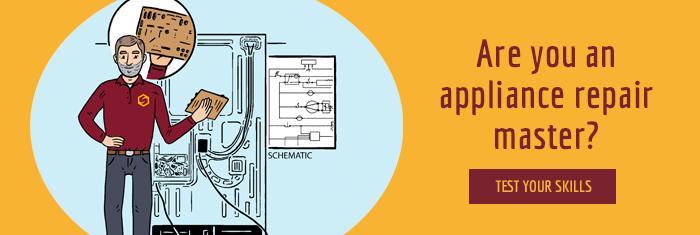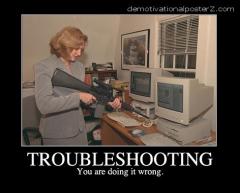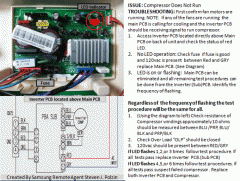FAQs | Repair Videos | Academy | Newsletter | Contact
Search the Community
Showing results for tags 'troubleshooting'.
-

Troubleshooting Gas Ovens like a Master Samurai Tech
Samurai Appliance Repair Man posted a blog entry in Samurai Appliance Repair Man's Blog
In the last webinar, we put on our Master Samurai Tech hats and did a cleanup service call on a gas oven after a parts changing monkey (PCM) had already been out and failed to diagnose and repair the problem. We looked at what the PCM did on the service call as well as he did not do but should have done. We did a quick review of how hot surface ignition (HSI) systems work and how variations in supply voltage can affect the operation of these systems. Then we got inside the head of a Master Samurai Tech and analyzed the problem like a professional technician would: by applying a detailed, technical understanding of the system being troubleshot and understanding how to use specifications to interpret electrical measurements and anticipate ignition system response. Professional Appliantologist members here at Appliantology can access and watch this webinar recording along with all the past webinar recordings on the Webinar Recordings Index Page. -

[Webinar] Gas Oven Service Call after a Parts Changing Monkey, Monday, May 8, 2017 @7PM
Samurai Appliance Repair Man posted an event in Tech Training
untilWho: - Professional Appliantologists, Senior Appliantology Fellows, and Legacy Tech members at Appliantology - Master Samurai Tech Academy students enrolled in any technical course - Mr. Appliance® Academy students enrolled in Bundle 1 What: Gas Oven Service Call after a Parts Changing Monkey. We're called in on a gas oven problem after a PCM has already failed to identify and fix the problem. This Office Hours is based on a true story! When: Monday, May 8, 2017, at 7PM Eastern Time (adjust your time zone accordingly) Where: All of our web meetings are powered by Join.me. For the connection details, see below. - Professional Appliantologists, Senior Appliantology Fellows, and Legacy Techs- See this topic in the Bidness Skool forum - Master Samurai Tech Academy Students: RSVP here. - Mr. Appliance® Academy Bundle 1 Students: RSVP here. How: Here are a couple tips to ensure that the webinars are a smooth, cool experience for you: 1. Arrive early to make sure your connection is working! Also, if you show up late for the webinar, you'll be lost. 2. Watch this ultra-short video on how to use your Join.me control console while you're in the web meeting because you're gonna wanna do cool stuff like: - correctly connect your audio (without producing the dreaded echo!) so you and everyone else can hear what the Samurai is explaining - mute and unmute yourself so we can keep the microphones open and we can all talk -

[Webinar] Troubleshooting Case Studies; Open Q&A, Monday, April 24 @7PM ET
Samurai Appliance Repair Man posted an event in Tech Training
untilWho: - Professional Appliantologists, Senior Appliantology Fellows, and Legacy Tech members at Appliantology - Master Samurai Tech Academy students enrolled in any technical course - Mr. Appliance® Academy students enrolled in Bundle 1 What: Troubleshooting Case Studies and Open Q&A. We'll apply the Ten Step Tango troubleshooting procedure to a couple of service call scenarios on gas and electric ovens. We'll use whatever time we have left for open Q&A. If you have a specific question you'd like us to go over, please send it in now so I can have time to prepare instructional material. You can do that by posting it here as a reply to this Calendar event. When: Monday, April 24, 2017, at 7PM Eastern Time (adjust your time zone accordingly) Where: All of our web meetings are powered by Join.me. For the connection details, see below. - Professional Appliantologists, Senior Appliantology Fellows, and Legacy Techs- See this topic in the Bidness Skool forum - Master Samurai Tech Academy Students: RSVP here. - Mr. Appliance® Academy Bundle 1 Students: RSVP here. How: Here are a couple tips to ensure that the webinars are a smooth, cool experience for you: 1. Arrive early to make sure your connection is working! Also, if you show up late for the webinar, you'll be lost. 2. Watch this ultra-short video on how to use your Join.me control console while you're in the web meeting because you're gonna wanna do cool stuff like: - correctly connect your audio (without producing the dreaded echo!) so you and everyone else can hear what the Samurai is explaining - mute and unmute yourself so we can keep the microphones open and we can all talk-
- webinar
- electric ovens
-
(and 3 more)
Tagged with:
-

The Future of Appliance Repair: a Profession or an "Idiocracy"?
Samurai Appliance Repair Man posted a blog entry in Samurai Appliance Repair Man's Blog
We have a lot of moving parts at play in the appliance repair industry today. Over the past couple of decades, appliance technology has become much more complicated, yet technician troubleshooting skills have eroded. This creates some uncertainty about the direction our industry is going. Are we going to be a profession, filled with well-paid, highly-skilled technicians at the top of their game, or a semi-skilled trade, filled with low-paid parts changers who are essentially just the eyes and hands carrying out the directions of tech-line personnel? Will both of these types of techs coexist, or will one go extinct? We’ve worked with thousands of techs and scores of business owners online over the years, most of whom take training and their profession seriously. We meet lots of folks like that at events such as ASTI. It makes us feel that the transition from trade to profession is here, and here to stay. A big wake-up call for the Samurai Recently, however, I had an abrupt reminder that there are still many who are not on board with that vision and are also influencing the direction of our industry. I was doing ride-alongs with techs at a large service company to assess the effectiveness of our online training at The Master Samurai Tech Academy. I was surprised and dismayed to see that the techs weren’t using many of the techniques that we emphasize in our training, such as coming to a job prepared with tech documents, doing a simple load analysis using the schematic, and performing electrical measurements from easy-access locations to definitively identify the component failure. In fact, they seemed to have forgotten even how to do many of these things. What the heck? Where did I go wrong? It all became clear to me when I had a chance to go over the day’s calls with a service manager for the company. When I described the troubleshooting methods we used on a dryer call, he declared that we had gone "full retard" (a phrase from the movie Tropic Thunder) for actually looking at the schematic, doing a few amp readings and one simple Ohm’s Law calculation. I was speechless. This is the guy who is supervising the techs who were paid to go through Master Samurai Tech training. However, it explained what I had seen that day. Although one of the senior managers at this company saw the value of using the MST Academy training for their techs, the other managers were not on board. Many of the skills taught at the Academy were not just ignored or discouraged, they were outright ridiculed. So of course the techs basically became parts-changers who simply carried out instructions from their manager or tech line. At that point, another movie came to mind, Idiocracy, which imagines the dismal result of several hundred years of cultural anti-intellectualism. I’m used to encountering techs who are a bit defensive about their lack of troubleshooting skills, but when even service managers mistake pattern recognition, parts changing, and a collection of factoids for real troubleshooting or, worse yet, have become hostile to it, then idiocracy is gaining a foothold in the appliance repair trade. Attitudes: the good, the bad, and the ugly Over the past decades, the technical skill level among many appliance techs has degenerated to such a low level that they don't even know what cause-and-effect troubleshooting is anymore. Since service managers are now being promoted from this group of techs, this attitude has become firmly entrenched in some organizations. In all my dealings with techs over the past 20 years, I have come to realize how phenomenally important attitude is. And I’ve seen it all. Some techs love to keep learning and sharpening their skills, no matter how many years they’ve been doing it, and enjoy the pride of accomplishment and the profits that come along with it. Then there are others who have worked long enough to have some know-how based purely on pattern recognition (“if this problem on that model change this part”) and resist the notion that their job performance and income would benefit even further if they learned real troubleshooting skills. The causes of this attitude include ignorance, arrogance, and laziness. Ignorance is curable through outreach and training. Arrogance and laziness are difficult and dangerous qualities in a tech, but even worse in someone who is in a leadership role. What's the risk to the industry if too many techs go down the road of idiocracy? Doesn’t that just give an opening for more success by those companies that behave like professionals? Not necessarily. The expression "a rising tide lifts all boats" works in the opposite direction as well. The experiences our customers have with “parts changers” can negatively impact their future interactions with other service companies. They will often be more suspicious and price sensitive. Furthermore, appliance manufacturers are seeing this problem in the appliance repair industry today, too. They realize there is uneven, often inadequate technical expertise in the trade. As a result, they are adapting to this general dumbing down in troubleshooting skills by dumbing down their training programs to essentially spoonfeeding what's already in the service manuals, knowing that most techs don't RTFM. They're also developing new technologies to decrease reliance on field techs to troubleshoot and solve problems. Here's what the future could hold: - Wifi-enabled appliances will report errors and diagnostics directly to the manufacturer's central technical staff who are specialists in that product. - Corporate techs can then run diagnostics and do most troubleshooting remotely. - The service company is then dispatched to simply replace a part- no troubleshooting required. If this comes to fruition, the end result will be a decrease in skill level expectation from technicians. And since higher pay accompanies and incentivizes the acquisition of specialized skills, there will be a concomitant reduction in "technician" pay and skill level. Service managers will be be reduced to route makers and time card checkers with a corresponding reduction in their skill level expectation and pay. All is not lost on this front. I speak with enough manufacturers to know that they would still like a better trained corps of appliance techs out there who can keep our mutual customers more satisfied. They haven’t given up on us yet! Take a look at yourself! Have you looked at yourself? I’m sure most of you reading this don’t come anywhere near being the kind of person who would call technical troubleshooting going "full retard." But, we would all benefit by stepping back and taking an honest look at our attitudes and expectations to see what part we are playing in raising our trade to a profession, and identify (and remedy) any weak links in our organizations. After all, if you’ve invested in training the techs in your company, it’s a waste of money if you aren’t implementing and nurturing the skills and practices that the techs learned in that training. Here’s what I still see too often when I go on ride-alongs with techs. Do you recognize any of these traits in your own service calls? 1. The tech arrives at the service call with no technical literature (service manual, tech sheet, bulletins) pre-loaded on his tablet or notebook computer. A manager may have pre-screened the calls and had probable parts pre-loaded on the service tech's vehicle, but the tech himself/herself is walking into the call completely cold. 2. If the call is anything other than a simple mechanical problem or parts replacement, the tech calls either his service manager or the manufacturer tech line. 3. Either way, the tech is spoon fed information to complete the diagnosis or repair; he is merely following detailed instructions but not doing the troubleshooting himself. From the tech's standpoint, this is only adding to his internal database of pattern recognition and factoids. 4. Neither the service manager nor the tech line guy has the time, patience, or skill to use this experience as a teaching moment and coach the tech through a troubleshooting thought process by asking leading questions. Examples: - what is your load of interest on the schematic? - what other components have you identified in the circuit for that load? - where does the schematic indicate that you would test the power supply for that load? 5. The appliance may get repaired as a result of the spoon feeding but the tech never grows in his ability to perform independent troubleshooting analysis-- he has simply added another pattern to his repertoire for recall on another job with the same problem. Reliance on outside counsel such as service manager and manufacturer tech line, which should be a rare event for a skilled tech, is perpetuated. Job security for the service manager and tech line guy is assured, but no skill growth for the service tech takes place. The foregoing is a typical pattern of degraded tech performance that is accepted as the "new normal" by far too many service companies. The problem is compounded when the service company middle management-- the service managers-- not only accept this degraded performance, but defend it. Pattern recognition and a head full of factoids do have their place in appliance repair. In fact, these form the basis of experience in older technicians, allowing for quick diagnosis and repair of commonly-occurring problems with known solutions. But these experiential skills should not be mistaken as classical troubleshooting and are insufficient for service calls with problems that don't fit the pattern or are "off the flow chart." The rewards of professionalism Techs who take the time to hone their craft with training, continuing education, and pre-diagnostic work are true professionals. Being prepared and able to competently troubleshoot any type of appliance and failure scenario is where the big payoffs happen in terms of reputation and profit. First Call Completes are maximized, callbacks are minimized, and cheerleader customers are forged. That’s what a professional business looks like. Is it too late to turn back the tide of idiocracy in the appliance repair trade? We at Master Samurai Tech firmly believe it is not too late and we have developed affordable, time-flexible training solutions to aid our brethren in the Craft. These skills are eminently learnable by anyone who desires to do so, and we’ve seen countless examples of techs and owners who have reaped the rewards of rising to the challenge. Join us, and help avert the future portrayed here: In a recent webinar, I offered a mental framework for executing classical troubleshooting strategies during service calls. Professional Appliantologist members and Master Samurai Tech Academy students may watch the 1-hour webinar recording here:- 31 comments
-
- technician
- professionalism
- (and 4 more)
-

[Webinar] Troubleshooting Gas Ranges, Monday, April 3 @7PM ET
Samurai Appliance Repair Man posted an event in Tech Training
untilWho: - Professional Appliantologists, Senior Appliantology Fellows, and Legacy Tech members at Appliantology - Master Samurai Tech Academy students enrolled in any technical course - Mr. Appliance® Academy students enrolled in Bundle 1 What: We'll apply the Ten Step Tango troubleshooting procedure and what we learned about gas ignition systems in the last Office Hours to case study troubleshooting scenarios on gas ranges. When: Monday, April 3, 2017, at 7PM Eastern Time (adjust your time zone accordingly) Where: All of our web meetings are powered by Join.me. For the connection details, see below. - Professional Appliantologists, Senior Appliantology Fellows, and Legacy Techs- See this topic in the Bidness Skool forum - Master Samurai Tech Academy Students: RSVP here. - Mr. Appliance® Academy Bundle 1 Students: RSVP here. How: Here are a couple tips to ensure that the webinars are a smooth, cool experience for you: 1. Arrive early to make sure your connection is working! Also, if you show up late for the webinar, you'll be lost. 2. Watch this ultra-short video on how to use your Join.me control console while you're in the web meeting because you're gonna wanna do cool stuff like: - correctly connect your audio (without producing the dreaded echo!) so you and everyone else can hear what the Samurai is explaining - mute and unmute yourself so we can keep the microphones open and we can all talk-
- webinar
- troubleshooting
-
(and 2 more)
Tagged with:
-

New Appliance Service Manual added: Samsung 4-DOOR Refrigerator Diagnostics Guide
tpoindexter posted a topic in Appliance Service Manual Requests Forum
Samsung 4-DOOR Refrigerator Diagnostics Guide View File Diagnostics guide for Samsung 4-Door refrigerators. Submitter tpoindexter Submitted 02/21/2017 Category Appliance Repair Manual Pot Luck Supper-
- refrigerator
- troubleshooting
-
(and 4 more)
Tagged with:
-

Samsung 4-DOOR Refrigerator Diagnostics Guide
tpoindexter posted a file in Appliance Repair Manual Pot Luck Supper
-
- samsung
- error codes
-
(and 4 more)
Tagged with:
-

[Webinar] Ten-Step Tango Troubleshooting Workshop: Refrigerators - Monday, January 16, 2017 @7PM ET
Samurai Appliance Repair Man posted an event in Tech Training
untilWho: - Professional Appliantologists, Senior Appliantology Fellows, and Legacy Tech members at Appliantology - Master Samurai Tech Academy students enrolled in any technical course - Mr. Appliance® Academy students enrolled in Bundle 1 What: We'll continue our troubleshooting workshop series by applying the Ten-Step Tango procedure to several different refrigerators and scenarios. When: Monday, January 16, 2017, at 7PM Eastern Time (adjust your time zone accordingly) Where: All of our web meetings are powered by Join.me. For the connection details, see below. - Professional Appliantologists, Senior Appliantology Fellows, and Legacy Techs- See this topic in the Bidness Skool forum: https://appliantology.org/topic/61520-webinar-ten-step-tango-troubleshooting-workshop-refrigerators-monday-january-16-2017-7pm-et/ - Master Samurai Tech Academy Students: RSVP here. - Mr. Appliance® Academy Bundle 1 Students: RSVP here. How: Here are a couple tips to ensure that the webinars are a smooth, cool experience for you: 1. Arrive early to make sure your connection is working! Also, if you show up late for the webinar, you'll be lost. 2. Watch this ultra-short video on how to use your Join.me control console while you're in the web meeting because you're gonna wanna do cool stuff like: - correctly connect your audio (without producing the dreaded echo!) so you and everyone else can hear what the Samurai is explaining - mute and unmute yourself so we can keep the microphones open and we can all talk- 1 comment
-
- ten-step-tango
- refrigerators
-
(and 2 more)
Tagged with:
-
From the album: Fundamentals
Do it right with the Ten Step Tango: -

The Master Samurai Tech Ten-Step Tango for Troubleshooting Appliances
Samurai Appliance Repair Man posted a blog entry in Samurai Appliance Repair Man's Blog
Troubleshooting is the big missing skill among appliance techs today. This is the skill that distinguishes parts changing monkeys (PCMs) from Master Samurai Techs. It's the difference between a drunken street brawler making monkey jabs versus a trained MMA fighter making kill shots. PCMs will thrash about wildly, monkey-jabbing at components hoping to get lucky and usually end up getting their asses kicked. Anyone can monkey jab and the sad truth is that this is the dominant practice of the appliance repair trade today. It doesn't have to be that way. Anyone who wants to can learn how to make kill strikes like a Master Samurai Tech. Master Samurai Techs don't rely on luck. They have a plan of attack, a strategy. They deploy precision kill strikes that have been honed in the Dojo-- training at the Master Samurai Tech Academy and in the Office Hours webinars-- and systematically dominate the appliance. Whether you're troubleshooting a simple GE dryer with just a mechanical timer or a Sub-Zero refrigerator with a microcomputer board, multiple sub boards and two different compressor technologies, the troubleshooting procedure is the same. That's the Ten-Step Tango: a structured, disciplined procedure for solving problems. In our Office Hours webinars, we've begun a series of workshops on the Ten-Step Tango, applying it to different troubleshooting scenarios on real-world appliances. We started off by introducing the Ten-Step Tango procedure and then applied it to simple appliances (no control boards, just mechanical controls, like timers). Then, in the next workshop, we kicked it up a notch and troubleshot appliances with multiple control boards, digital communications, hoodoo, voodoo, and all kinda weird stuff. The workshop webinar recordings, along with all the other Office Hours webinar recordings, are available for Professional Appliantologists and Master Samurai Tech Academy students to watch at the links below: Master Samurai Tech Academy Students: http://mastersamuraitech.com/webinar-recordings/ Mr. Appliance® Academy Bundle 1 Students: http://mrappliance.mastersamuraitech.com/appliance-repair-course-support/student-forums/forum/webinar-recordings/ Professional Appliantologists: https://appliantology.org/topic/58003-webinar-recordings-index-page/ The next workshop will be in January 2017 and will be announced here at Appliantology as well as in the MST-Appliantology newsletter.- 4 comments
-
- office hours
- troubleshooting
-
(and 3 more)
Tagged with:
-

[Webinar] Tech Training, topic TBA, Monday, December 19 @7PM ET
Samurai Appliance Repair Man posted an event in Tech Training
untilWho: - Professional Appliantologists, Senior Appliantology Fellows, and Legacy Tech members at Appliantology - Master Samurai Tech Academy students enrolled in any technical course - Mr. Appliance® Academy students enrolled in Bundle 1 What: Technical topic to be announced in the MST-Appliantology newsletter. If you'd like to get on the newsletter mailing list, you may do so here. If you have a particular topic or tech sheet you'd like us to talk about, please post it below. When: Monday, December 12, 2016, at 7PM Eastern Time (adjust your time zone accordingly) Where: All of our web meetings are powered by Join.me. For the connection details, see below. - Professional Appliantologists, Senior Appliantology Fellows, and Legacy Techs- See this topic in the Bidness Skool forum: https://appliantology.org/topic/61253-webinar-tech-training-topic-tba-monday-december-19-2016-7pm-et/ - Master Samurai Tech Academy Students: RSVP here. - Mr. Appliance® Academy Bundle 1 Students: RSVP here. How: Here are a couple tips to ensure that the webinars are a smooth, cool experience for you: 1. Arrive early to make sure your connection is working! Also, if you show up late for the webinar, you'll be lost. 2. Watch this ultra-short video on how to use your Join.me control console while you're in the web meeting because you're gonna wanna do cool stuff like: - correctly connect your audio (without producing the dreaded echo!) so you and everyone else can hear what the Samurai is explaining - mute and unmute yourself so we can keep the microphones open and we can all talk- 1 comment
-
- webinar
- mst office hours
-
(and 2 more)
Tagged with:
-

The Master Samurai Tech Academy's Troubleshooting Ten-Step Tango for Appliance Repair
Samurai Appliance Repair Man posted a file in Appliance Repair Manual Pot Luck Supper
Version 1.0.0
114 downloads
This is the Ten Step Troubleshooting Tango we discussed in the Office Hours webinar on 12/12/2016. It presents a procedure for troubleshooting any appliance that will help keep your thinking straight and avoid floundering around like a parts changing monkey. We'll use this structure in future troubleshooting workshop webinars.-
- 1
-

-
- troubleshooting
- appliance repair
-
(and 1 more)
Tagged with:
-

New Appliance Service Manual added: The Master Samurai Tech Academy's Troubleshooting Ten-Step Tango for Appliance Repair
Samurai Appliance Repair Man posted a topic in Appliance Service Manual Requests Forum
The Master Samurai Tech Academy's Troubleshooting Ten-Step Tango for Appliance Repair View File This is the Ten Step Troubleshooting Tango we discussed in the Office Hours webinar on 12/12/2016. It presents a procedure for troubleshooting any appliance that will help keep your thinking straight and avoid floundering around like a parts changing monkey. We'll use this structure in future troubleshooting workshop webinars. Submitter Samurai Appliance Repair Man Submitted 12/16/2016 Category Appliance Repair Manual Pot Luck Supper-
- ten steps
- appliance repair
-
(and 1 more)
Tagged with:
-

Webinar Recording: Appliance Service Call Structure and Troubleshooting Strategies
Samurai Appliance Repair Man posted a blog entry in Samurai Appliance Repair Man's Blog
Great turn out for this webinar-- had over 30 people on! That means there are lots of techs who recognize the need for help with these skills. This is good because they can be easily learned by anyone who wants to learn them! This webinar lays out a road map for you to declare your independence from tech lines. Professional Appliantologist members may watch the webinar recording here: Appliance Service Call Structure and Troubleshooting Strategies Master Samurai Tech Academy students may watch here: Click here to go to the webinar! Mr. Appliance® Academy Bundle 1 students may watch here: Appliance Service Call Structure and Troubleshooting Strategies This recording has also been added to the ever-growing Webinar Recordings Index Page.-
- troubleshooting
- service calls
-
(and 2 more)
Tagged with:
-

[Webinar] Appliance Service Call Structure and Troubleshooting Strategies, Monday, October 24 @7PM ET
Samurai Appliance Repair Man posted an event in Tech Training
untilWho: - Professional Appliantologist members at Appliantology - Master Samurai Tech Academy students enrolled in any technical course - Mr. Appliance® Academy students enrolled in Bundle 1 What: Appliance Service Call Structure and Troubleshooting Strategies. A disciplined, focused troubleshooting structure is something that most techs are lacking, even those with many years of experience. This webinar will present an overall framework or mental structure that both prepares you for the call and helps to organize and focus your thinking during the call. Both experienced and new techs will benefit from this webinar. When: Monday, October 24, 2016, at 7PM Eastern Time (adjust your time zone accordingly) Where: All of our web meetings are powered by Join.me. For the connection details, see below. - Professional Appliantologists- See this topic in the PA forum: - Master Samurai Tech Academy Students: RSVP here. - Mr. Appliance® Academy Bundle 1 Students: RSVP here. How: Here are a couple tips to ensure that the webinars are a smooth, cool experience for you: 1. Arrive early to make sure your connection is working! Also, if you show up late for the webinar, you'll be lost. 2. Watch this ultra-short video on how to use your Join.me control console while you're in the web meeting because you're gonna wanna do cool stuff like: - correctly connect your audio (without producing the dreaded echo!) so you and everyone else can hear what the Samurai is explaining - mute and unmute yourself so we can keep the microphones open and we can all talk-
- troubleshooting
- training
-
(and 2 more)
Tagged with:
-

Applying Circuit Fu Katas on a Whirlpool Electric Dryer Schematic
Samurai Appliance Repair Man posted a blog entry in Samurai Appliance Repair Man's Blog
In this video, I use an old skool Whirlpool electric dryer to demonstrate electric circuit troubleshooting and analysis techniques. This is the ancient art of Circuit Fu. Although this is a simple circuit by today's standards, the principles and techniques can be used on any circuit because electricity works the same way. When you know basic electricity and circuits, you can decipher these diagrams and become a troubleshooting master... Learn Circuit Fu and how to kick appliance butt at the Master Samurai Tech Academy. The training is distilled down to the fundamental essentials that every appliance tech should know (but, alas, many do not). The training covers the classic skills, like those shown above, yet is up to to date with the current technologies used in modern appliances. Our training is affordable for anyone, self paced, on demand, and comprehensive. Enroll at the Master Samurai Tech Academy and start learning today: http://MasterSamuraiTech.com-
- circuit fu
- troubleshooting
-
(and 2 more)
Tagged with:
-

Samsung No Inverter Compressor Operation Troubleshooting Guide.gif
Samurai Appliance Repair Man posted a gallery image in The Appliantology Gallery
From the album: Refrigerator Repair
Models: RF265ADBP/XAA / RF265ADPN/XAA / RF265ADWP/XAA / RF266ADBP/XAA / RF266ADPN/XAA / RF266ADRS/XAA / RF266ADWP/XAA / RF267ADBP/XAA / RF267ADPN/XAA / RF267ADRS/XAA / RF267ADWP/XAA / RF26VADBP/XAA / RF26VADPN/XAA / RF26VADWP/XAA / RFG237AABP/XAA / RFG237AAPN/XAA / RFG237AARS/XAA / RFG237AAWP/XAA / RFG238AARS/XAA / RFG295AABP/XAA / RFG295AAPN/XAA / RFG295AARS/XAA / RFG295AAWP/XAA / RFG295ABBP/XAA / RFG295ABPN/XAA / RFG295ABRS/XAA / RFG295ABWP/XAA / RFG297AABP/XAA / RFG297AAPN/XAA / RFG297AARS/XAA / RFG297AAWP/XAA / RFG297ABBP/XAA / RFG297ABPN/XAA / RFG297ABRS/XAA / RFG297ABWP/XAA / RFG298AABP/XAA / RFG298AAPN/XAA / RFG298AARS/XAA / RFG298AAWP/XAA / RFG299AARS/XAA / RFG299ABRS/XAA-
- samsung
- refrigerator
-
(and 3 more)
Tagged with:
-
Miele G892 SCU Plus F06 Too few pulses at flow meter/start of water intake
AllPhase posted a topic in DIY Appliance Repair Help
I've got a Miele G892 SCU Plus, and I'm getting an F06 error code: Too few pulses at flow meter/start of water intake what pulses? does anyone have a service manual? All i'm finding online is it could be the flowmeter board or the WPS. Is Miele the only source for parts?- 1 reply
-
- miele
- dishwasher
-
(and 2 more)
Tagged with:
-

Troubleshooting a Bosch Dishwasher No Heat Problem Using the Schematic and Live Tests
Samurai Appliance Repair Man posted a blog entry in Samurai Appliance Repair Man's Blog
In this video for Professional Appliantologist members and Master Samurai Tech Academy students, I show you how to troubleshoot a Bosch dishwasher no-heat problem. No heat problems can manifest in a variety of ways: really long cycle times, a "1" shown on the display at the end of the cycle, or as an error code. Some models will show an error code readout, others may just show the error code as a flashing light. Whichever way, you need to troubleshoot the heating circuit. As with all electrical problems, you need to use the schematic to pinpoint the open (bad) component. The problem could be the circuit board heating relay, the heater thermostat, the heating element itself, or the pressure switch. I show you how to use the schematic and live voltage tests to pinpoint the exact problem. Professional Appliantologist members can watch the video at the link below: Master Samurai Tech Academy students can watch the video here: http://mastersamuraitech.com/webinar-recording-troubleshooting-bosch-dishwasher-no-heat-problem-using-schematic-live-tests/ Here's the schematic used in the video: Learn how to troubleshoot like a pro online at the Master Samurai Tech Academy: http://mastersamuraitech.com-
- schematic
- live tests
-
(and 3 more)
Tagged with:
-

Troubleshooting a Samsung Electric Dryer No-Heat Problem from the Control Board
Samurai Appliance Repair Man posted a blog entry in Samurai Appliance Repair Man's Blog
Join the Samurai on this Samsung electric dryer service call and learn how to troubleshoot a no-heat complaint from the control board, without having to tear apart the whole dryer, by using the schematic and strategic electrical tests. Work smarter, not harder! Learn how to troubleshoot appliances like a real technician at http://mastersamuraitech.com Professional Appliantologist members here at Appliantology should watch my webinar recording on troubleshooting this same problem using live voltage tests for deeper understanding of troubleshooting techniques -
From the album: Master Samurai Tech
Learn how to troubleshoot like a real tech at http://mastersamuraitech.com-
- circuit fu
- appliance repair
-
(and 3 more)
Tagged with:
-

New Appliance Service Manual added: Speed Queen Home Dryer Troubleshooting Manual
Adirondack Bob posted a topic in Appliance Service Manual Requests Forum
Speed Queen Home Dryer Troubleshooting Manual View File Models: ADE30RGS171TW01 ADE3LRGS171TW01 ADE41FSS171TN01 ADE4BFGS171TW01 ADE4BRGS171TW01 ADG30RGS111TW01 ADG3LRGS111TW01 ADG41FSS111TN01 ADG4BFGS111TW01 ADG4BRGS111TW01 AES17AWF AES20AWF AES28AWF AES28AWF1500 AES68AWF AES68AWF1500 AGS17AWF AGS20AWF AGS28AWF AGS68AWF ASE30FGW171TW01 ASG30FGW111TW01 CES68AWF CES68AWF1500 CGS68AWF KES18AWF KES18AWF1500 KGS18AWF PUB 512176 Revision 2 January 2012 Submitter Adirondack Bob Submitted 05/28/2016 Category Appliance Repair Manual Pot Luck Supper-
- 512176
- troubleshooting
-
(and 3 more)
Tagged with:
-

Speed Queen Home Dryer Troubleshooting Manual
Adirondack Bob posted a file in Appliance Repair Manual Pot Luck Supper
Version 1.0.0
215 downloads
Models: ADE30RGS171TW01 ADE3LRGS171TW01 ADE41FSS171TN01 ADE4BFGS171TW01 ADE4BRGS171TW01 ADG30RGS111TW01 ADG3LRGS111TW01 ADG41FSS111TN01 ADG4BFGS111TW01 ADG4BRGS111TW01 AES17AWF AES20AWF AES28AWF AES28AWF1500 AES68AWF AES68AWF1500 AGS17AWF AGS20AWF AGS28AWF AGS68AWF ASE30FGW171TW01 ASG30FGW111TW01 CES68AWF CES68AWF1500 CGS68AWF KES18AWF KES18AWF1500 KGS18AWF PUB 512176 Revision 2 January 2012-
- 1
-
.png)
-
- speed queen
- troubleshooting
-
(and 3 more)
Tagged with:
-

Circuit Fu - Reviving the Ancient Lost Art of Appliance Repair
Samurai Appliance Repair Man posted a blog entry in Samurai Appliance Repair Man's Blog
Whoo-WEE, things sure have changed in the 20 short years I’ve been doing appliance repair! The appliances themselves have changed from discrete mechanically-controlled machines to computers that do appliance functions. But the level of skill among technicians has changed, too. Somewhere along the way, essential skills like a working knowledge of basic electric circuits and using schematics to develop troubleshooting strategies have gotten scarce. In other words, there’s a critical shortage of Circuit Fu among appliance techs today. The appliance repair trade is probably worse off than most of the other skilled trades because the apprenticeship programs are practically non-existent, there are not many cost-effective training venues left today, and appliances have become increasingly more complex and computer-controlled. So you’re left with a double-whammy: the technical skills have gone down at precisely the time they’re needed the most as appliances have gotten more complex to troubleshoot. [Read the full article here]-
- circuit fu
- troubleshooting
-
(and 3 more)
Tagged with:
-

Circuit Fu - The Ancient Lost Art of Appliance Repair
Samurai Appliance Repair Man posted a gallery image in The Appliantology Gallery
From the album: Master Samurai Tech
Learn the ancient lost art in appliance repair today: Circuit Fu, real troubleshooting using the schematic and and tech sheet - http://mastersamuraitech.com





